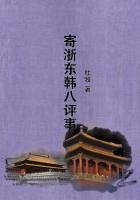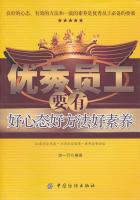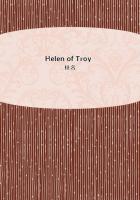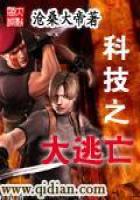There was a man and his wife who had one daughter. Mother and daughter were deeply attached to one another, and when the latter died the mother was disconsolate. She cut off her hair, cut gashes in her cheeks and sat before the corpse with her robe drawn over her head, mourning for her dead. Nor would she let them touch the body to take it to a burying scaffold. She had a knife in her hand, and if anyone offered to come near the body the mother would wail:
"I am weary of life. I do not care to live. I will stab myself with this knife and join my daughter in the land of spirits."
Her husband and relatives tried to get the knife from her, but could not. They feared to use force lest she kill herself. They came together to see what they could do.
"We must get the knife away from her," they said.
At last they called a boy, a kind of simpleton, yet with a good deal of natural shrewdness. He was an orphan and very poor. His moccasins were out at the sole and he was dressed in wei-zi (coarse buffalo skin, smoked).
"Go to the tepee of the mourning mother," they told the simpleton, "and in some way contrive to make her laugh and forget her grief.
Then try to get the knife away from her."
The boy went to the tent and sat down at the door as if waiting to be given something. The corpse lay in the place of honor where the dead girl had slept in life. The body was wrapped in a rich robe and wrapped about with ropes. Friends had covered it with rich offerings out of respect to the dead.
As the mother sat on the ground with her head covered she did not at first see the boy, who sat silent. But when his reserve had worn away a little he began at first lightly, then more heavily, to drum on the floor with his hands. After a while he began to sing a comic song. Louder and louder he sang until carried away with his own singing he sprang up and began to dance, at the same time gesturing and making all manner of contortions with his body, still singing the comic song. As he approached the corpse he waved his hands over it in blessing. The mother put her head out of the blanket and when she saw the poor simpleton with his strange grimaces trying to do honor to the corpse by his solemn waving, and at the same time keeping up his comic song, she burst out laughing.
Then she reached over and handed her knife to the simpleton.
"Take this knife," she said. "You have taught me to forget my grief. If while I mourn for the dead I can still be mirthful, there is no reason for me to despair. I no longer care to die. I
will live for my husband."
The simpleton left the tepee and brought the knife to the astonished husband and relatives.
"How did you get it? Did you force it away from her, or did you steal it?" they said.
"She gave it to me. How could I force it from her or steal it when she held it in her hand, blade uppermost? I sang and danced for her and she burst out laughing. Then she gave it to me," he answered.
When the old men of the village heard the orphan's story they were very silent. It was a strange thing for a lad to dance in a tepee where there was mourning. It was stranger that a mother should laugh in a tepee before the corpse of her dead daughter. The old men gathered at last in a council. They sat a long time without saying anything, for they did not want to decide hastily. The pipe was filled and passed many times. At last an old man spoke.
"We have a hard question. A mother has laughed before the corpse of her daughter, and many think she has done foolishly, but I think the woman did wisely. The lad was simple and of no training, and we cannot expect him to know how to do as well as one with good home and parents to teach him. Besides, he did the best that he knew. He danced to make the mother forget her grief, and he tried to honor the corpse by waving over it his hands."
"The mother did right to laugh, for when one does try to do us good, even if what he does causes us discomfort, we should always remember rather the motive than the deed. And besides, the simpleton's dancing saved the woman's life, for she gave up her knife. In this, too, she did well, for it is always better to live for the living than to die for the dead."















